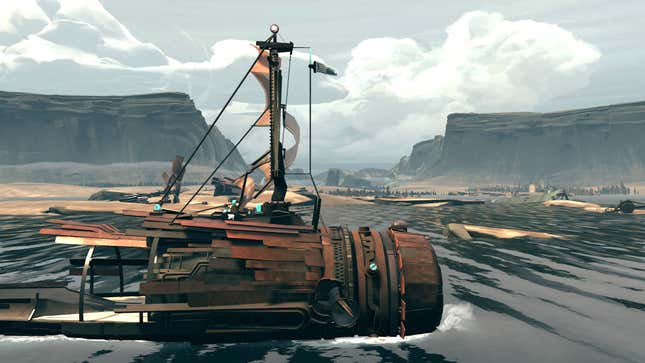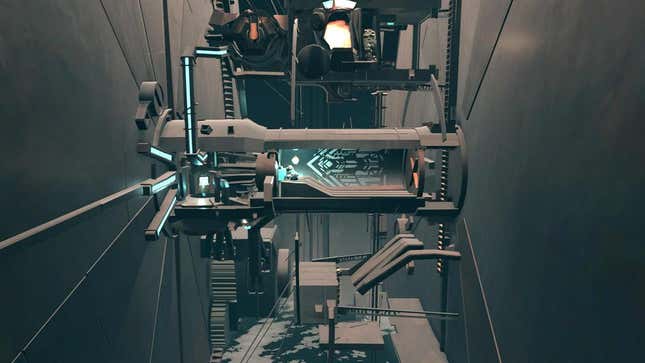
The past two months have been defined by massive, sprawling adventures that sap all of your free time (and part of your soul). As a result, this week, I’ve found myself gravitating toward a tighter, more focused game, Okomotive’s Far: Changing Tides.
Far: Changing Tides, released earlier this month for PC, Switch, PlayStation, and Xbox—and as part of the Game Pass library—is a sequel to 2018’s Far: Lone Sails, a captivating side-scrolling journey in which you cross vast distances in a creaky old vessel. I expected as much out of Changing Tides. What I didn’t expect, and what I was pleasantly surprised to learn, is that it’s also a deft, smartly crafted puzzle-platformer, one clearly borne out of the school of Playdead (Limbo, Inside).
Like most anything with the Playdead pedigree (and its own predecessor, Lone Sails), Far: Changing Tides opens cold. You, as a silent, unnamed protagonist, wake up underwater. You apparently can hold your breath indefinitely—a perk that, at least speaking personally, banished the creeping claustrophobia that tends to come with underwater segments in video games. You eventually break the surface.
It’s at this point that I figured the game would give me a steampunk sailboat, because, y’know, the whole “sailing game” thing. Instead, I found myself leaping between rooftops of mostly submerged buildings. Far: Changing Tides takes place in a post-apocalyptic setting where cities full of Mediterranean-style architecture have been swamped by a vague flood of biblical proportions. There’s no immediate explanation about what happened, so the act of leaping from roof to roof is lent a mysterious air.

But even that brief platforming segment didn’t lead me to a boat. No, no, first came the wave of environmental puzzles.
One early puzzle sees you trapped in a garage. You have to pull an emergency release cable and hook it to an anchor on the far wall to let yourself out. Problem number one: The anchor is underwater. Problem number two: The cable itself isn’t, and there’s no way to reach it (because the player character is tiny). The solution, then, is simply to move a box underneath the cable, clamber on top of it, grab the cable, dive underwater, and hook it to the anchor. The Witness, this game is not, but the puzzles—all of which, a few hours in, have been of similar scale and complexity—require just enough mental energy to keep Far: Changing Tides engaging: sailing toward the right side of the screen.
The sailing in Far: Changing Tides sounds tedious on paper, but in practice it clicks with a lovely cadence that pleasantly engages but never overwhelms. You can raise your mast and catch a breeze, further adjusting your sail’s pitch to speed up or slow down. But if you’re coming up on an overpass, you have to lower the mast, lest it get clipped. And if there’s no wind, you’ll need to scrounge up salvage from the ocean floor and burn it—by jumping up and down on a bellow—to fire up an engine. But if you run out of fuel, you’ll stall out. Everything is constantly breaking, catching fire, so you do have to maintain some attention, but nothing to the degree of the season’s big blockbusters. On the open sea, you can zone out a bit. You’ll be okay.
Far: Changing Tides features a striking, museum-worthy art style, its steampunk designs done up in a delectable oil painting aesthetic. The whole package comes together as a placid, moving puzzle game, one that plays out with the soft, predictable swells of tidal charts, as if you’re riding the waves of an open ocean without a care, because there’s nothing left to care about. We can only hope the end of the world is so serene.